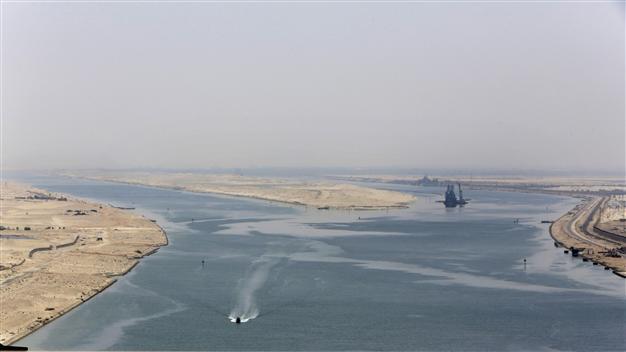Egypt's Sisi inaugurates 'new Suez Canal'
ISMAILIYA, Egypt - Agence France-Presse

An army zodiac secures the entrance of the new section of the Suez Canal in Ismailia, Egypt, Thursday, Aug. 6, 2015. AP Photo
President Abdel Fattah al-Sisi kicked off a lavish ceremony on August 6 to unveil a "new" Suez Canal, as Egypt sought to boost its economy and international standing by expanding the vital waterway.Sisi, dressed in ceremonial military uniform, began the ceremony by leading a naval flotilla aboard a historic yacht as fighter planes and helicopters flew overhead.
Security was tightened, with the Islamic State of Iraq and the Levant's (ISIL) warning that it might execute a Croatian kidnapped near Cairo threatening to overshadow the celebrations, showcased by authorities as proof the country was safe.
The event in the port city of Ismailiya attended by several heads of state, including French President Francois Hollande, comes two years after then army chief Sisi overthrew his Islamist predecessor.
Mohamed Morsi's ouster unleashed a deadly crackdown on Islamists, and a jihadist insurgency has killed hundreds of soldiers east of the Suez Canal.
ISIL's Egyptian affiliate released a video Wednesday threatening to execute hostage Tomislav Salopek, a worker with French geoscience company CGG, within 48 hours unless Egypt frees jailed Muslim women.
Croatian Foreign Minister Vesna Pusic was due in Cairo Thursday to try to secure Salopek's release.
Sisi, elected last year on a promise to strengthen security and revive a dilapidate economy, broke ground on the canal project last August.
Initial estimates suggested the new route would take up to three years to build, but Sisi set an ambitious target of 12 months.
It has been touted as a landmark achievement, rivalling the digging of the original 192-kilometre (119-mile) canal, which opened in 1869 after almost a decade of work.
The new section, built at a cost of $9 billion (7.9 billion euros) and funded entirely by Egyptian investors, runs part of the way alongside the existing canal connecting the Red Sea and the Mediterranean.
"It's an achievement for the people who managed to fund it as a national project and accomplished it through perseverance and hard work," Sisi's office has said.
It involved 37 kilometres of dry digging, creating what is effectively a "second lane", and widening and deepening another 35 kilometres of the existing canal.
It will cut the waiting period for vessels from 18 hours to 11.
By 2023 the number of ships using the canal will increase to 97 per day from 49 now, the government hopes.
Officials hope the new waterway will more than double Suez earnings from $5.3 billion expected at the end of 2015 to $13.2 billion in 2023.
Analysts were sceptical over the projections.
"The first priority for shipowners and traders is to cut costs, not speed. The trend in recent years has been for ships to travel at lower-than-normal speeds just to... save on their fuel bills," said Ralph Leszczynski, research head at Italian shipbrokers Banchero Costa.
"I do not see any shipowner happy to pay higher fees for shorter waiting hours."
The inauguration ceremony began with Sisi leading the naval procession.
Newly acquired French Rafale warplanes and US F-16s, delivered just last week, participated in the fly-past.
Banners saying "New Suez Canal: Egypt's Gift to the World" and "The Egyptian Miracle," as well as hundreds of Egyptian flags, graced the streets of Cairo and Ismailiya.
Dozens of buses ferried invitees to the site of the ceremony as security forces deployed in Ismailiya.
Waiving Egyptian flags, a crowd gathered at Cairo's Tahrir Square -- epicentre of protests that ousted Morsi and his predecessor Hosni Mubarak.
"On June 30 (2013) we changed the course of history; today we are changing the geography of the world," said jubilant tour operator Ibrahim El-Khatab, referring to the day when millions protested against Morsi demanding his resignation.
The waterway is a cornerstone for Sisi to boost his regime's legitimacy after a deadly crackdown on dissent.
In revenge, militants have killed hundreds of policemen and soldiers, mostly in the Sinai Peninsula that lies between Israel, the Gaza Strip and the Suez Canal.
Amr Adly, of the Carnegie Middle East Center, said that "since Morsi's ouster, the new regime is engaged in a political conflict to prove its legitimacy inside and outside Egypt.
"The ability to accomplish such an economic project is part of cementing this legitimacy."
The waterway is part of a comprehensive project to develop the area adjacent to the canal into an industrial hub.
"There is a stream of investors who want to invest" in Egypt, Suez Canal Authority chief Mahob Mameesh said last week.
He said around one million jobs are expected to be created over the next 15 years.
















